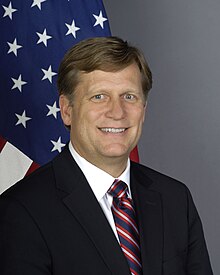Michael McFaul
American political scientist, author, and diplomat
Michael Anthony McFaul (born October 1, 1963) is an American academic and diplomat who served as the United States Ambassador to Russia from 2012 to 2014. McFaul is currently the Ken Olivier and Angela Nomellini Professor in International Studies in the Department of Political Science at Stanford University, where he is the Director of the Freeman Spogli Institute for International Studies.

Quotes
edit- The people working at the White House at the time are friends of mine, and they're friends of mine to this day. I don’t want to trivialize how difficult their decisions were. They did not have good choices.
- "Michael McFaul - The Frontline Interview" in PBS (23 June 2017)
- Correlation is not causation, as we like to say here at Stanford, and the fact that I arrived in the middle of that had to do with our long confirmation process in America. Nothing to do with Russian politics. But in Russia, that was not the way it was portrayed. In Russia, it was portrayed that I was sent deliberately by President Obama to lead the revolution. And given my background as an academic, I've written about the political transitions and democratization, that was a very easy story.
- "Michael McFaul - The Frontline Interview" in PBS (23 June 2017)
- I'm 100 percent for lifting sanctions on Russia, provided they change their behavior for why the sanctions were put in place. It’s just that simple.
- "Michael McFaul - The Frontline Interview" in PBS (23 June 2017)
- It’s incumbent upon all people to believe in the facts and to keep pushing it. You can’t constrain free speech, but you can speak more loudly about what is factual.
- I hope that from crisis and tragedy comes engagement. Don’t just complain about [an issue], do something about it! Don’t just lament about the current state of affairs, vote!
- We're not good at point predictions. But we are pretty good at some long-term trajectory things, over hundreds of years, right? Over hundreds of years, there's a pretty strong correlation between the more well-to-do a society is, the more educated it is, the more urban it is, the more income GDP per capita, the more likely there is to be demand for democracy.
- We got to get our democracy in order at home, but we can walk and chew gum at the same time. Two wrongs do not make a right.
- In rhetorical terms and broad strokes, in terms of ambition, I think the Biden administration has a fundamentally different approach to Putin than Trump did. I’m using my words very precisely — the Trump administration had a policy towards Russia, but Trump himself had a much more friendly relationship with Putin. There is little gap between President Biden and the Biden administration on that front.
- There is a big academic literature on under what conditions sanctions work and don’t work, on when they can change the behavior of targeted countries. And most times, they don’t work. That’s what the literature says.
- If both China and Russia were liberal democracies, I don’t think we would be having conversations about great power competition. So I believe that regime type does matter, and the ideological dimension that comes with that regime type also plays a role in great power competition.
- Today, however, Russia and China are united as autocracies. They do have this ideological connection. Both countries have tense relations with the United States and the liberal democratic world, and that brings them together.
- The last thing I would say is to remind people that there are some things that are very different in this era compared to the Cold War. We should just take them as being different and not shoehorn them into some Cold War battle. I think this is particularly true with China, because we are so much more integrated with the Chinese economy, with Chinese society, even with Chinese students — I assume you have as many Chinese students at Yale as we do here at Stanford. Those are dimensions of great power engagement that we didn’t have during the Cold War. Rather than thinking of them always as threats and feeling the need to disengage and untangle our partnerships, I hope that smart leaders — and it’s your generation that will have to do this, not mine — will think of those as potential assets for American power and American society.
- I speak in general. I think that Putin does not understand that criticizing power can help this power. How do we fight corruption in the United States? There are two forces - independent media and powerful opposition party.
- I guess my preliminary take away is that China is running a brilliant foreign policy right now. They have convinced the Russians that they have a strategic relationship when in fact the most important bilateral relationship for them is with us, and that’s smart; that’s good diplomacy. I don’t know what will happen in the long run, but I think that’s a great position to be in. They fully understand that the management and deepening of their relationship with US is way more important than any other bilateral relationship, including with Russia. Just because trade levels, for economic and security reasons, the bilateral relationship is the most important for them. Russia is peripheral in that respect. Having said that, maintaining good relations with many countries is in the Chinese interest, and that’s what they’re doing.
External links
edit- Encyclopedic article on Michael McFaul on Wikipedia
- Media related to Michael McFaul on Wikimedia Commons